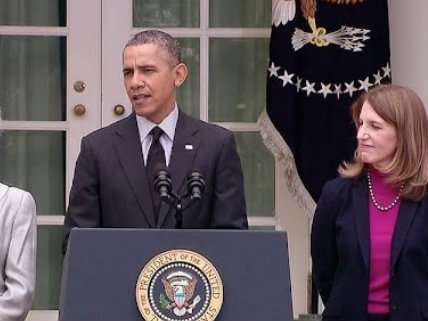Is Obamacare's Insurer Bailout Legal? GOP Legislators Want to Know

Last month, buried in a 435-page regulatory filing from the Centers for Medicaid and Medicaid Services (CMS), the Obama administration attempted to reassure the health insurance industry that, if necessary, federal officials would find money to make payments for Obamacare's "risk corridors"—the temporary shared-risk financing system built into the health law that has been dubbed a bailout of the health insurance industry.
The regulatory filing reiterated the administration's position that the program would likely be revenue neutral. But in the event that it's not, it seemed designed to suggest that insurers shouldn't worry.
"In the unlikely event of a shortfall for the 2015 program year," the regulation said, "HHS [Health and Human Services] recognizes that the Affordable Care Act requires the Secretary to make full payments to issuers. In that event, HHS will use other sources of funding for the risk corridors payments, subject to the availability of appropriations."
On the surface, that seems pretty clear: If the risk corridors program, a symmetrical arrangement which requires the administration to cover half of insurer losses if claims expenses go beyond 103 percent of expected costs and insurers to pay in if costs come in at 97 percent of expectations, ends up costing the administration money, it will find a way to pay.
The complication comes from the final phrase: "subject to the availability of appropriations."
That could be a problem. Because according to a January memo from the Congressional Research Service (CRS), there do not appear to be appropriations available to make the payments. Although the health law does direct the Secretary of Health and Human Services to make risk corridor payments, the CRS memo explains that the legislation "does not specify a source from which those payments are to be made."
That's a problem. According to the Government Accountability Office (GAO), it's not enough for a statute merely to direct payment. It also must designate which funds are to be used. Both elements must be present in order for a payment to be lawful.
So where will the money come from? How will the administration shift the money around if they don't have the authority to tap any particular funds? That's what Rep. Fred Upton (R-Mich.) of the House Energy and Commerce Committee and Sen. Jeff Sessions (R-Ala.) of the Senate Budget Committee want to know.
The two GOP legislators have written a letter to newly installed HHS Secretary Sylvia Mathews Burwell asking for an explanation of just how the administration believes it can justify the creative financing it has promised, should such spending become necessary.
Does Burwell agree with the legal analysis offered by CRS and GAO? Does HHS have a legal analysis of its own? Given the legal analysis stacked against the administration, these seem like basic, reasonable questions that should be answered and explained.
In confirmation hearings before being confirmed as HHS Secretary, Burwell suggested that she would be more open, transparent, and responsive to Congress than her predecessor, Kathleen Sebelius, with regards to the health law. That's a low bar. How Burwell responds will tell us something about whether she's clearing it, and if so, by how much.
Read the complete Upton/Sessions letter below.


Show Comments (18)